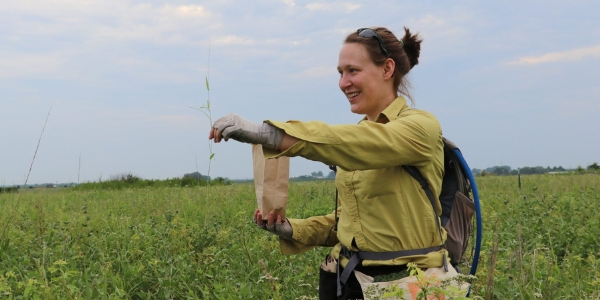Mosquito-borne viruses and mystery emerge as summer ends
The burgers and sunscreen might be in your shopping cart for the holiday weekend, but health officials ask that you remember your bug spray, too.
It could be lifesaving.
Health leaders throughout Michigan have been warning residents for several weeks now of the emergence of several mosquito-borne viruses, while an outbreak of Eastern Equine Encephalitis — a virus that recently showed up in two Michigan horses — has turned deadly along the East Coast.
Meanwhile in a Lansing-area lab, West Nile Virus has been detected in 32 dead birds — from hawks and owls to ducks and robins, according to Julie Melotti, a wildlife pathologist at the Michigan Department of Natural Resources.
That compares to 21 positive cases in Michigan last year, and 14 in 2019, Melotti said.
And with September and October ahead, “we still have a lot of mosquito season left,” she noted.
(Numbers aren’t comparable in 2020-2022 because of lower testing during the pandemic.)
With climate change and the resulting warmer weather, mosquitos made an early appearance in Michigan this spring, and experts warned that Michiganders might see more ticks as well.
Thankfully for now — “knock on wood,” said Tom Barnes, director of the Macomb County Division of Environmental Health Services — the detections of West Nile Virus have mostly been in mosquitos that are collected for testing. Still, when West Nile begins to appear in mosquito samples and animals, it’s a matter of time before humans in Michigan are infected, he said.
But while it appears to be an average or even above-average year for mosquitoes and virus detections in animals, “I’m

surprised we haven’t seen more West Nile Virus,” said Edward “Ned” Walker, professor of entomology and microbiology and EEB core faculty member at Michigan State University and noted mosquito expert.
Last year, the MIchigan Department of Health and Human Services reported 24 human cases of West Nile Virus to the U.S. Centers for Disease Control and Prevention, according to a state health department spokesperson.
This year, it has detected just five cases so far. That’s a bit of a mystery, Walker said.
It may be that the mosquito that carries West Nile to humans — Culex pipiens — doesn’t seem to be as populous this year as Culex restuans, which carries the virus, but doesn’t pass it to humans, he said.
In short, West Nile might be spreading among animals, but “it’s not spilling over
into humans this year,” Walker said.
Still, Melotti, the wildlife pathologist, public health expert Barnes and leading
mosquito researcher Walker agree: Michiganders need to stay vigilant against the three arboviruses — insect-borne — that have proven the highest threat in Michigan:
And while nationally, cases are generally detected in the eastern or Gulf Coast states, geography isn’t a protection for Michigan. In 2019, the state was part of the largest human outbreak in more than a half-century. That year, 38 people were sickened by EEE across the country, including 10 in Michigan. Throughout the country, 12 died.
In fact, about 30% of people infected with the virus will die, and survivors often have serious, ongoing neurologic problems. Symptoms of infection include fever, headache, vomiting, diarrhea, seizures, behavioral changes, and drowsiness.
Michigan’s cases in 2019 drew national public health attention and set off a statewide, airborne spraying campaign — the first since 1989 — to kill mosquitoes that carry the disease.
Two residents from Livingston and Wayne counties tested positive for Jamestown Canyon Virus, a virus that often begins when a mosquito bites an infected deer and then a human.
The virus has been detected in 13 mosquito collections — six in Saginaw County, three in Bay County, and one each in Berrien, Calhoun, Dickinson, and Kent counties.
Like West Nile Virus, some people are infected but never get sick. Still, Jamestown Canyon Virus, like West Nile Virus, also can cause serious neurologic disease, including meningitis or encephalitis.
Five Michigan residents, one each in Berrien, Delta, Genesee, Livingston and Macomb counties, are known to have been sickened by West Nile Virus this year.
That’s the leading cause of mosquito-borne disease. It’s usually not deadly, but that doesn’t mean it’s a walk in (your favorite Michigan) park.
Dr. Anthony Fauci, who had led the U.S. COVID-19 response efforts, was recovering at home this month after being hospitalized for several days with a West Nile virus infection.
“I really felt like I’d been hit by a truck,” Fauci told StatNews. “I have to tell you, I’ve never been as sick in my life. Ever. By far, this is the worst I’ve ever been with an illness.”
West Nile virus has been found in one horse from Eaton County and 25 birds in Detroit and Delta, Genesee, Grand Traverse, Jackson, Kalkaska, Kent, Lenawee, Livingston, Luce, Marquette, Mason, Monroe, Oakland, Saginaw, Tuscola, and Washtenaw counties. The virus was also detected in mosquito collections in Bay (64), Calhoun, Kent (14), Macomb (4), Oakland, Ottawa (2), Saginaw (7), St. Clair (6), and Washtenaw (3)
Meanwhile, Eastern equine encephalitis virus — a very rare but highly deadly virus for humans — was detected in two horses in Van Buren County.
Fewer than a dozen cases are reported each year in the country, on average, according to the U.S. Centers for Disease Control and Prevention.
But on Tuesday, New Hampshire reported its first death from the virus, just days after Plymouth — along coastal Massachusetts — announced it would close public parks and fields at night after mosquitoes in the area tested positive for EEE and the state reported its first human case of the virus since 2020, according to news reports. Other Massachusetts counties have been placed at high or critical risk for spread this year.



